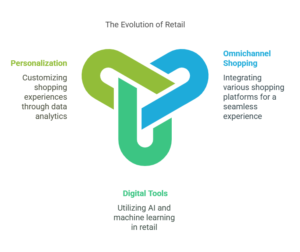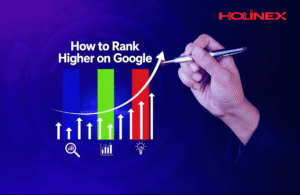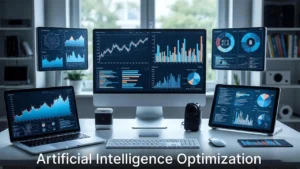Table of Contents
The digital landscape is ever-evolving, creating a multitude of opportunities across a broad range of sectors. From healthcare to retail, from energy to education, digital transformation is not just revolutionizing the way industries operate but also shaping their future. This article will shed light on the key trends in digital transformation across various industries.

1. Healthcare: Telemedicine and AI Diagnostics
In the healthcare sector, digital transformation is synonymous with improved patient care. Telemedicine is a prime example. The recent pandemic gave it a significant boost, with virtual consultations becoming the norm for non-emergency situations. This trend will likely stay, making healthcare accessible for remote and elderly populations.
Furthermore, AI diagnostics are gaining momentum. AI algorithms can analyze vast amounts of data faster than humans, improving diagnosis and treatment plans accuracy. This shift towards AI-powered healthcare will likely increase efficiency and reduce human errors in the industry.
2. Retail: Omnichannel Shopping and Personalization
The retail industry is experiencing a shift towards omnichannel shopping experiences. Customers now expect a seamless shopping journey, whether in-store, online, or mobile applications. Retailers employ digital tools like AI and machine learning to create an integrated shopping experience.
Moreover, personalization is becoming more critical. Retailers use data analytics to understand customer behaviour better and offer personalized recommendations. This level of personalization enhances customer loyalty and boosts sales, making it a key trend in the retail industry’s digital transformation.

3. Energy: IoT and Predictive Maintenance
The energy sector leverages digital transformation through the Internet of Things (IoT). IoT devices can monitor and control energy systems in real-time, improving efficiency and reducing costs. Moreover, these devices can predict and prevent system failures, leading to a decline in unplanned outages.
Another significant trend is predictive maintenance, which uses machine learning algorithms. This technology can analyze data from equipment sensors to predict potential malfunctions, enabling proactive maintenance and reducing downtime.
4. Education: E-Learning and Virtual Reality
In the education sector, e-learning is gaining prominence. Digital platforms offer flexibility and accessibility, enabling students to learn at their own pace. From recorded lectures to interactive quizzes, digital transformation is reshaping education.
Virtual reality (VR) is also making its way into classrooms. VR can create immersive educational experiences, making learning more engaging and effective. As technology improves and becomes more accessible, VR in education is expected to grow.

5. Manufacturing: Automation and Digital Twins
Manufacturing is embracing digital transformation through automation. Robots and AI increasingly take over repetitive tasks, improving efficiency and reducing human errors. This trend is likely to continue as technology improves and becomes more affordable.
Digital twins, virtual replicas of physical systems, are becoming prevalent in manufacturing. They enable real-time monitoring and simulation, helping to optimize processes and predict potential issues before they occur.

Digital transformation is the future.
A digital transformation is no longer an option but a necessity. It reshapes industries and sets new standards for efficiency, customer experience, and innovation. As technology continues to evolve, businesses must keep pace with digital trends to stay competitive and future-proof.
From AI diagnostics in healthcare to omnichannel experiences in retail, IoT in energy to e-learning in education, and automation in manufacturing – digital transformation is paving the way to the future. As we navigate this digital era, embracing these key trends will be instrumental for businesses across all industries.
While digital transformation brings numerous benefits, it is essential to address its challenges, such as cybersecurity and data privacy issues. Businesses must take proactive measures to leverage digital transformation responsibly and effectively.
In a world that is increasingly interconnected,



































